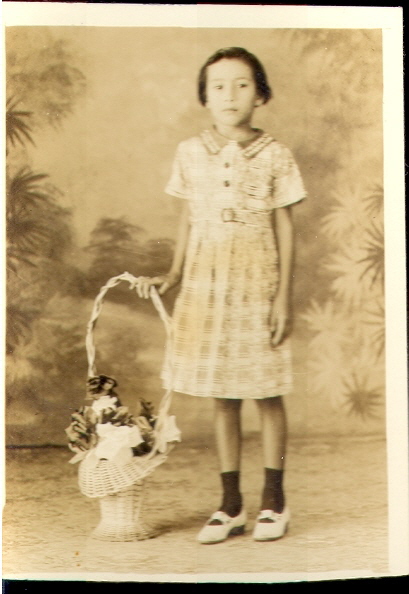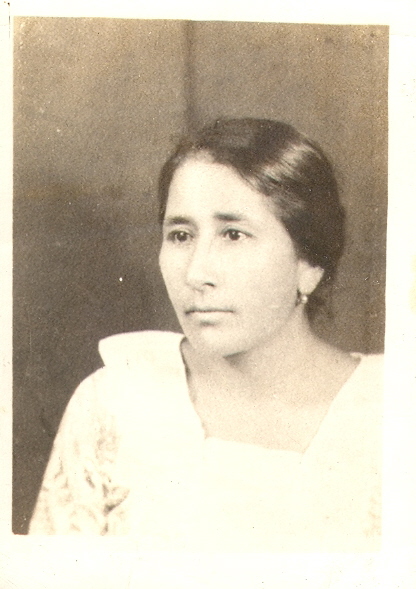Julia Gonzales (nee Salais)


Where were you born?
In…umm…Kenedy, Texas.
How long did you live there?
About a year or two.
When did you move to San Antonio?
Well, I’m 83. It must have been about 80 years ago.
How old were you during the Great Depression?
I was about…between 5 and 6.
Did you live in San Antonio?
Yes, we lived here in San Antonio.
What was life like before, can you describe a typical day?
It was pretty bad; it was what you call…a Depression. We waited to see what happened.
The truth of it, waiting to see how the day was going to come out.
My dad would find a little job to bring us food.
What was it like in the beginning?
Well, it was very very tough. No shoes no clothes.
Once in a while, we used to have handovers (hand-me-downs/ hand-outs).
What were some of the changes your family had to make?
When things finally got better, my father got a better job, and things got a little bit better.
When did you realize things were going to be hard?
Well, at my age of 5 and 6, that’s when things were bad. Well, during the years, maybe 7 years old.
But after that, times started to get better. Not good, but a little bit better.
How did your parents react, how did they respond to what was happening?
Well, we worried…mostly every other day,
everyday to keep us…you know together in health or whatever…food, and at home.
What kind of jobs did your parents have?
My father used to cut yards…and then when time came better, he used to work for the government (My great-grandfather worked at Kelly Air Force Base through the W.P.A.,the Works Progress Administration)…like um…I can’t remember the name.
He used to earn very little, but better than before.
So he had government jobs?
Yes.
Did your family earn enough to get what they needed?
Oh no. Definitely no…until years and years later.
What did ya’ll eat?
Anything that my father could find.
Did you continue school or did you have to get a job?
No, I continued school till junior high school.
That was the years after 7, 8 from there on I went to school until I graduated from junior high school.
What was school like?
It was pretty good. Then the times were a little bit better. My father had a job by then from Kelly Field.
He worked with (indistinct) Tea Room…that was better.
Did you ever have jobs?
No…I never did work.
What was it like to grow up with a large family during the Depression?
Oh…well…it was just uh…by the time I was growing up…like between 7 and 12, I would say, it was just me and my sister, the rest, they were married.
They were old enough in the past years.
Where did you live?
Here in San Antonio. We lived first, in uh…in some street, I can’t even remember I was so young.
We lived on the street by the fire station, the ones that I remember were near where Joske’s before getting to Joske’s from here it was about two, three blocks before…I think the name was um…Water Street…I don’t remember.
Those were the first that I remember where we lived.
 Did you ever have any opportunities to have fun?
Did you ever have any opportunities to have fun?
No.
Did you attend church regularly?
Oh yes. Not that much then, because…you know…for the appearance.
Clothes, shoes, or whatever. But when we could we would.
Did you speak English or Spanish at home?
Spanish.
When did you learn English?
When I started going to school.
So your teachers taught you?
Oh yes.
Did your family have to travel anywhere?
No. Never.
Did your family benefit from government programs?
Yes. Years and years ago they used to call it the relief.
They used to give us…dry milk in bags, for us to use however we wanted to…and some raw beans, of course…a sack of raw beans…and um…flour.
And the little bit my father worked…we would get eggs, sausage, and stuff like that. But years ago, with 1 dollar you could say it was like having 50 dollars now…cause with a penny or two you could buy a lot.
With ten cents I would say.
When did things finally get better?
Well a little bit better I would say um…when I was about 9. 9 years old going on 10.
What did you learn from all of this?
Oh…to take care of my money (laughs) if I was ever to be…within my years.
And to…you know…learn things more about life to be better than the life that we had.
Is there anything else you would like to add to this interview?
No…I don’t think so. I just don’t ever want to go through that again.
(Crying) I never want to go through those days. My father used to work for a dime a day and some bread.
A dime. That was his salary. He used to take me to the store…it’s still there…and with a dime…with a penny we could buy two or three eggs. With two cents we could buy chorizo (sausage). And that was breakfast. A lot of things with that amount. He could buy more than four or five things.
With a dime! We used to share a soda and cut pieces of French bread and then I ate then dipped them in the soda.
Do you think it was good for you to experience that…did it make you a stronger person?
Oh yes. Definitely. Better…see things and consider.
The Handbook of Texas Online. Copyright © The Texas State Historical Association. The Handbook of Texas Online is a multidisciplinary encyclopedia of Texas history, geography, and culture sponsored by the Texas State Historical Association and the General Libraries at University of Texas at Austin. http://www.tsha.utexas.edu/handbook/online/ Last Updated: May 16, 2005.
AIER Cost-of-Living Calculator. The calculator uses the Consumer Price Index to do the conversions. The source for the data is the Bureau of Labor Statistics. The calculator converts the cost of items in American dollars from 1913 to the present. Organized in 1933 as a private, independent, scientific, and educational charitable organization, the American Institute for Economic Research plans its research to help individuals protect their personal interests and those of the Nation. American Institute for Economic Research (AIER), P.O. Box 1000, Great Barrington, Mass 01230. http://www.aier.org/colcalc.html. (2005).
Map Quest Shows maps on different levels (i.e. city, county, region, and state) "We got our start making paper maps for gas stations back in the 1960s. Now with more than 50 cartographers, map editors and research specialists on staff, our activities are supported by the Freile Research Center, the largest and most up-to-date private geographic information library in the USA." http://www.mapquest.com
U-S-History.com Links to different eras and maps of the United States. Also, tables and quizzes for refrences.http://www.u-s-history.com/.
Wikipedia Gives information on different topics in ten different languages. Organized by the Wikimedia Foundation. http://wikipedia.org/